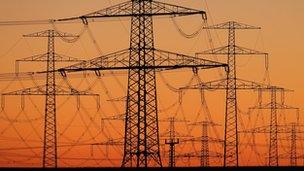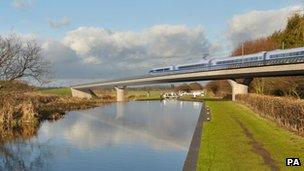Scottish independence: Priorities and powers
- Published

Would MI6 and MI5 share information and resources with an independent Scotland?
The politics of independence is about what you can do independently. Well of course it is. But we're learning that it's also defined by what has to be, or could be, done together by independent nations.
On Monday, Deputy First Minister Nicola Surgeon faced the question of whether an independent Scotland would need its own intelligence-gathering organisation, or if it would seek to share with the rest of the United Kingdom.
One argument goes that 300-plus years in a union means Scotland can lay claim to at least a population share of shared resources and assets, from embassies to Royal Naval ships to central bank reserves to welfare bureaucracies.
So what about MI5 and MI6? Both are so secretive, who is to know which bits could be split? And if they were, could you be sure who works for which side? I don't know any spooks. I don't think so anyway. But at headquarters, I doubt they'd entertain the notion for long.
A BBC Scotland debate looked into the case for separate or integrated immigration and asylum laws, not least if there were to remain free passage across the border.
Cables and subsidies
Much bigger and hopefully simpler issues are around the electricity grid and transport. Both also arose with the start of a new campaigning week.
On the grid, the cross-border trading of electricity took a step forward, with a memorandum of understanding between Ireland and the UK about selling renewable power across the Irish Sea.

Ireland and the UK have a memorandum of understanding about cross-border electricity trading
This, said the pro-independence side, demolishes the argument that Scottish consumers would have to subsidise all their own renewables. The argument, put forward by energy secretary Ed Davey among others, went on to suggest the subsidy loading would increase by a factor of as much as ten.
It's not an argument that takes much demolishing. The drive towards renewables is not being pursued in any one country, but across Europe, with climate change commitments made more widely. There are requirements to meet renewable targets, weighted towards those countries best able to pay.
So Luxembourg has to hit the highest per capita target in the EU. It makes sense for it to do so by trading its renewable obligations with those countries which have a comparative advantage in producing green energy.
Having such an advantage in wind and marine renewables, Scotland ought to be able to help others hit their targets, at times when Scotland is producing more than it needs. An independent Scotland could do so by selling into England and to the continent, through cables yet to be laid across the North Sea.
The government at Westminster, facing increasing resistance from anti-turbine campaigners, needs Scotland to meet its ambitious renewables targets if the UK is to meet more modest ones.
And we've learned this weekend that an independent Scotland would not set its subsidy system independently of its southern neighbour, but in an integrated British Isles market, and perhaps an increasingly integrated European one.
However, the politics of independence suggest that England, Wales and Northern Ireland could change direction, aiming to source more of their renewables from their own considerable offshore and tidal resources. England is already ahead of Scotland in opening offshore windfarms.
The £164m figure for offshore renewable investment in Scotland so far, released with the start of the week, looks big by most people's standards. But it's a long way from the kind of billions required to make this industry motor, and get turbine makers such as Gamesa and Areva to deliver on their conditional manufacturing announcements for Scotland. Expect to hear more about this from the First Minister, among others, when the offshore wind sector gathers in Aberdeen this week.
The other factor, as I've written before, is that Scotland can only sell its wind and marine power, for all those subsidies from customers in foreign countries, if those technologies remain competitive. There are other options. Solar is one to watch, with dropping costs and potential to keep Europe's lights on if a Mediterranean grid can be built to match the planned North Sea one.
International inter-city
As for rail, there's a strong economic case for Scotland to have a high-speed rail link linking it into London, London's airports and markets beyond.

There's a strong economic case for a high-speed rail link between Scotland and London
There's a compelling political case for those who support the union to build a high-speed rail line linking England with Scotland - both useful and symbolic.
There's an environmental case for replacing Scotland-London flights with rail journeys.
But viewed from London and facing the prospect of an independent Scotland, it's harder to make a financial case for building the line north of Manchester, as the UK government has set out to do.
It's pointed out that other countries have cross-border rail routes, and that's obviously true. But they have them either because there's been European central funding for improving cross-border integration (there's less of that around these days) or because there's a commercially viable case for linking up big population centres, often much bigger than that of Scotland.
So if Scotland became independent, imagine what would happen if Whitehall sat down to decide its transport priorities. Sorting out south-east England's airports, more motorways, a high-speed link between London and Newcastle, or to the south-west? Or keep building a high-speed link through the empty fields and hills between Manchester and Carlisle, there to link up with Scots heading south?
Politics is about priorities as well as powers.
You can also comment or follow Douglas Fraser on Twitter: @BBCDouglsFraser